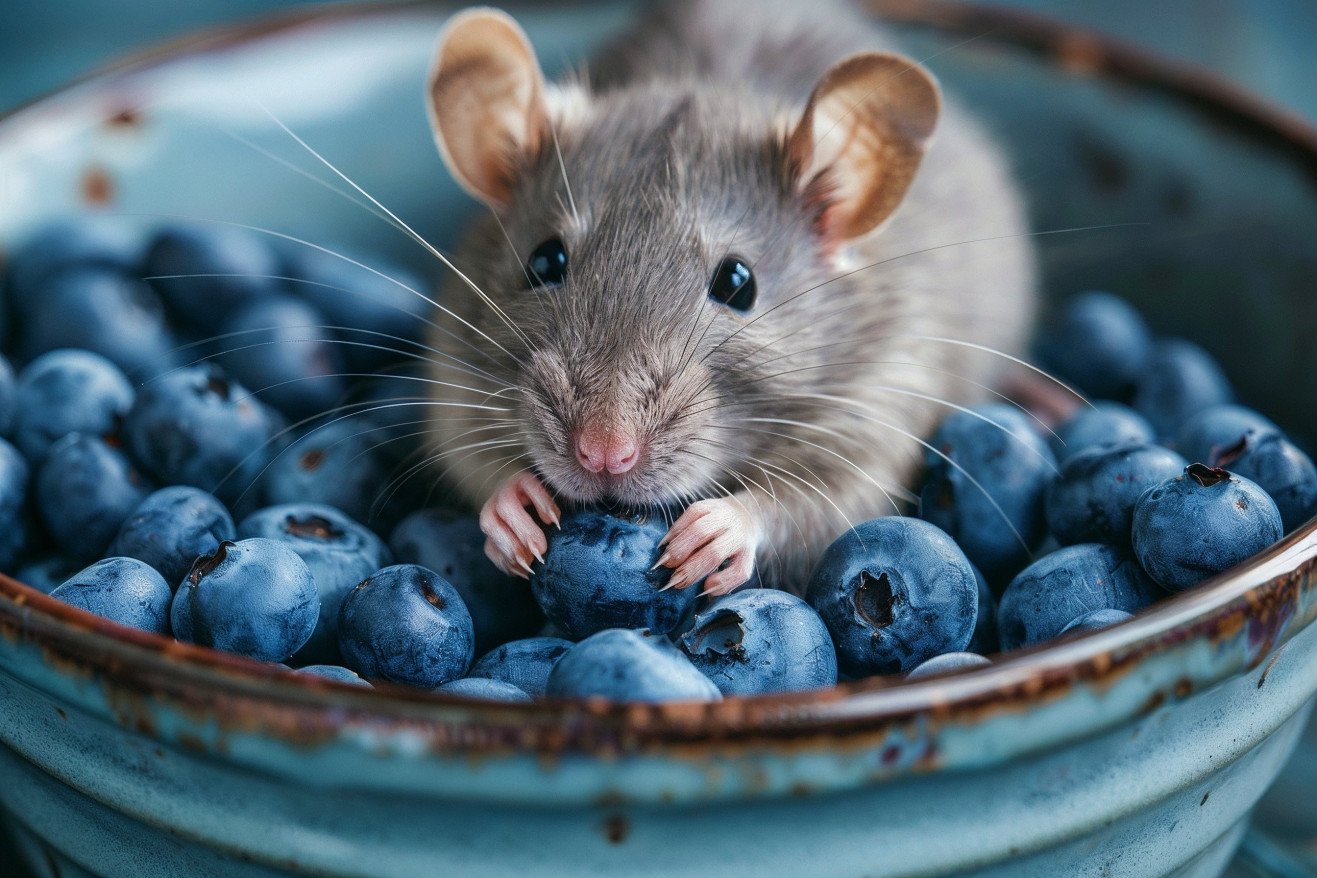Can Rats Eat Blueberries? A Look at Benefits and Risks
31 May 2024 • Updated 31 May 2024

Can rats eat blueberries, and what are the potential benefits and risks of incorporating these nutrient-rich fruits into your pet rat's diet? Yes, rats can eat blueberries in moderation as an occasional treat. Blueberries are a good source of antioxidants, fiber, and vitamins C and K for rats. However, their high natural sugar content means blueberries should only make up a small part of your rat's primarily grain and vegetable-based diet.
In the following sections, we'll examine scientific studies and expert opinions on the dietary needs of domestic rats. This research covers the nutritional value of blueberries, safe feeding amounts for rats, and potential concerns like pesticide residue or intestinal issues from overfeeding fruits high in natural sugars. With this information, you can make an informed decision about whether to feed blueberries as an occasional snack for your beloved pet rat.
Can rats eat blueberries?
Portion Control and Moderation
According to advice from Pets on Mom.com, fancy rats can eat blueberries a few times a week in small portions. That said, research has shown that rats can consume the equivalent of up to half a cup of blueberries per day, but it's best to stick to much smaller portions for pet rats. Even healthy foods like blueberries can be bad for rats if they're consumed in large amounts, which can lead to obesity or digestive issues, as pointed out by FOUR PAWS Australia. The RSPCA also notes that fresh foods should be fed in moderation alongside a rat's staple diet of specially formulated pellets.
It's important to make sure that you're feeding your rat blueberries and other fruits in moderation. While the antioxidants and vitamins in blueberries are good for your rat, the sugar content means that blueberries should be used as a supplement, not a replacement, for your pet rat's balanced diet. By making sure to stick to the recommended portion sizes of a few blueberries a couple of times a week, you can make sure that you and your pet rat can enjoy this healthy treat together.
Blueberry Benefits for Rat Health
In rats, blueberries have been shown to improve memory and decrease blood pressure through their antioxidant properties, according to a study that looked at the impact of a blueberry-enriched diet on rat hearts. In addition, research has found that blueberry diets can reverse age-related cognitive decline and protect against neurodegeneration in rats, according to the College of Agricultural Sciences.
The anthocyanin compounds in blueberries have also been shown to decrease inflammation, oxidative stress, and liver damage in older rats, according to a study published in 2021. Meanwhile, a study published in 2020 found that blueberry supplementation increased bone mineral density and decreased bone loss in young rats.
How to Add Blueberries to Your Rat's Diet
Like with any new food, it's important to add blueberries to your rat's diet slowly to avoid upsetting their stomach. The PDSA notes that "Suddenly changing your rat's diet can upset their stomach. Introduce new foods carefully and over several days." Rats can also be picky eaters, so Unusual Pet Vets suggests feeding young rats a variety of foods to encourage them to eat a diverse diet.
While blueberries can be a good option for a healthy treat, PetHelpful warns that "treats like fruits should only be given in small amounts, 1-3 times per week, to avoid obesity or other health issues." Blueberries can also be quite messy, so it's important to make sure that you're feeding them to your rat in a way that won't stain their fur and will keep their living space clean.
Life Stage Considerations
Blueberries can be a healthy addition to the diet of rats at any life stage, providing antioxidants and other important nutrients. For senior rats, a diet that includes blueberries may even help improve memory, strength, and coordination. This was the conclusion of a study by the University of Georgia that found blueberries were able to reverse age-related declines in physical performance in older rats.
Meanwhile, young rats may benefit from the bone-strengthening properties of blueberry compounds, with one study demonstrating that blueberry diets can increase bone density in young rats. That said, younger rats are also more likely to experience digestive upset when they consume too much fruit sugar, so it's important to introduce blueberries to them slowly and in limited quantities, as recommended by the RSPCA.
Conclusion: Blueberries Should Be Fed in Moderation
Even though blueberries are healthy, they can still cause problems if they are fed in large amounts, such as obesity and digestive issues, as pointed out by FOUR PAWS Australia. The RSPCA also cautions against feeding an excessive amount of fresh foods in addition to the specialized pellets that make up a rat's main diet.
Therefore, it's important to make sure that blueberries and other fruits are fed in moderation. While the antioxidants and vitamins in blueberries are valuable, their sugar content means that they should only be used to supplement a rat's diet, not as a primary source of nutrition. By making sure that you only feed your rat a few blueberries a couple of times a week, you can make sure that you and your pet rat can enjoy the benefits of this nutrient-rich fruit.


